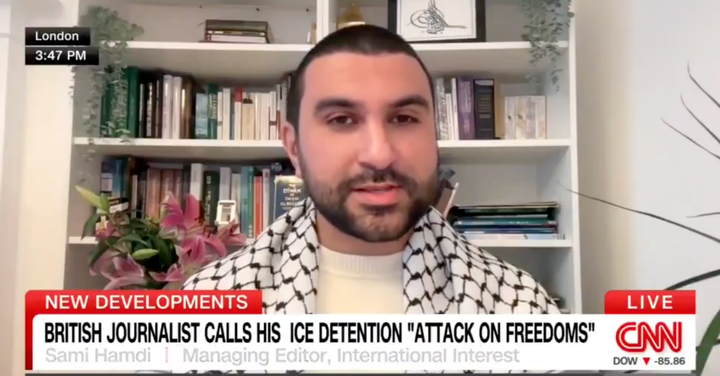UK Police Arrest French Publisher For Refusing To Share Pass Codes For Phone

The following article was made possible by paid subscribers. Support independent journalism on whistleblowers and press freedom and become a subscriber.
British police invoked terrorism law in the United Kingdom to question and later arrest a French publisher over his alleged involvement in protests in France.
Ernest Moret is the foreign rights manager for Editions La Fabrique. He arrived in London on April 17 to attend the London Book Fair.
Police detained Moret and demanded that he “give up his phone and pass codes to the officers, with no justification or explanation offered,” according to a joint press statement from Editions La Fabrique and Verso Books.
The following morning on April 18 the police arrested Moret and accused him of obstruction because he had refused to share his pass codes with police who detained him.
Around 6:30 p.m. local time, Moret was released by police and not charged. But his lawyer Maître Marie Dosé told Libération that he was still facing an investigation.
The police seized his computer and phone, and Dosé contended if the police are able to access the contents of his devices they will share the information with French authorities.
An update posted by Editions La Fabrique and Verso Books indicated that Moret was ordered by British counter-terrorism police to return to London in four weeks.
The British counter-terrorism system is unique in Europe as far as emergency legislation is concerned: it is the only one that allows, without any investigative leads, suspicious behaviour, prosecution or even official 'police custody,' to arrest, detain and interrogate individuals who automatically expose themselves to legal proceedings if they refuse to cooperate It also provides a very permissive legal framework for police officers to extract all data from any computer device or phone of an interrogated person. Despite his release, our colleague’s fundamental rights have been violated and his life subjected to a totally opaque state arbitrariness.
National Union of Journalists (NUJ) senior books and magazines organizers Pamela Morton condemned the arrest.
“It seems extraordinary that the British police have acted this way in using terrorism legislation to arrest the publisher who was on legitimate business here for the London Book Fair,” Morton declared.
PEN International indicated that they were “deeply concerned by the detention of French Publisher La Fabrique’s foreign rights manager,” who had planned to take part in the London Book Fair. They called for his immediate release.
As Editions La Fabrique and Verso Books shared, Moret had plans to meet with over 30 foreign publishers at the book fair. When he arrived at St. Pancras International railway station, officers stopped him for questioning under Schedule 7 of the Terrorism Act of 2000.
It evidently means that French and British police are collaborating to track down individuals who have participated in protests against French President Emmanuel Macron’s “pension reform” in France.
“We consider these actions to be outrageous and unjustifiable infringements of basic principles of the freedom of expression and an example of the abuse of anti-terrorism laws,” Editions La Fabrique and Verso Books further stated. “We consider that this assault on the freedom of expression of a publisher is yet another manifestation of the slide towards repressive and authoritarian measures taken by the current French government in the face of widespread popular discontent and protest.”
Both publishers announced that there would be a protest at the French Institute in London in the evening on April 18, where Moret had been scheduled to attend a reception. They also indicated that there would be a “simultaneous protest at the British Embassy in Paris.”
Stella Magliani-Belkacem, who is the editorial director for Editions La Fabrique, told the Guardian, “When we were on the platform, two people, a woman and a guy, told us they were counter-terrorist police. They showed a paper called section 7 of the Terrorism Act of 2000 and said they had the right to ask him about demonstrations in France,”
“I’m still shaking, we are in shock about what happened,” Magliani-Belkacem added.
While abuses of authority under Schedule 7 of the UK’s terrorism law have primarily targeted Muslims, journalists have also had to worry about authorities using the law to violate their rights to freedom of the press.
The NUJ previously noted that in October 2018 “the UK’s independent reviewer of terrorism legislation called for greater clarity over the use of Schedule 7 stops, which allow police to question people and copy data from their mobile phones and computers at ports and airports without reason for suspicion.”
In 2013, David Miranda, the partner of journalist Glenn Greenwald, was stopped under Schedule 7 for nine hours. Police detained Miranda in the hopes of seizing copies of documents from NSA whistleblower Edward Snowden that detailed United States and U.K. involvement in mass surveillance programs.
Multiple newspapers in the U.K. asked the Metropolitan Police and the French embassy in London for comment, however, they did not immediately respond to their requests.




Comments ()